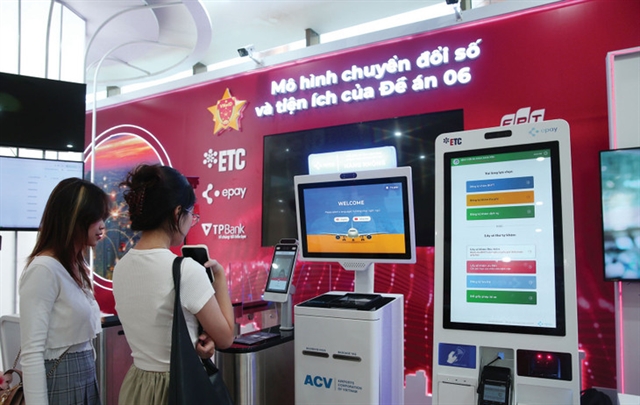 Business Beat
Business Beat

The explosion in e-commerce has sent demand for logistics, especially transportation, through the roof.
| ||
| Logivan, a Vietnamese platform that connects truckers with shipping companies, secured US$5.5 million from venture capital firm Alpha JWC and two angel investors, including David Su, the founding managing partner at Matrix Partners China. — Photo cafef.vn |
HÀ NỘI — On February 11 Logivan (LOGIVAN Technologies Pte), a Vietnamese platform that connects truckers with shipping companies, secured US$5.5 million from venture capital firm Alpha JWC and two angel investors, including David Su, the founding managing partner at Matrix Partners China.
Indonesia-based Alpha JWC has strengths in fintech and consumption, and is well-known in the US and China. It targets companies with strong growth and potential to expand to new markets in future.
A Logivan spokesman said the newly raised funds would be used to invest in data analysis and integration to improve the effectiveness of its supply chain and bring the best experience to customers.
The company will apply artificial intelligence in clarifying documents, meeting user demand and providing more accurate forecasts of orders. It will also continue to develop technologies to connect trucks and calculate transport costs.
Earlier this year Gemadept Joint Stock Company invested VNĐ100 billion ($4.41 million) into one of its subsidiaries, Phục Long Port Limited Company, to increase its charter capital to VNĐ300 billion ($13.04 million) to expand its business scope.
In 2018 Phục Long Port made a significant contribution to Gemadept’s turnover of VNĐ2.3 trillion and after-tax profit of VNĐ1.9 trillion, which represented increases of VNĐ200 billion and 3.2 times.
The port’s success encouraged Gemadept to further invest in logistics services, a company spokesperson said.
According to Vietnam Report released last December by Việt Nam Report Joint Stock Company, 73 per cent of enterprises involved in the logistics sector believe that the sector will grow by 10 per cent this year and see robust development of transportation in the e-commerce sector.
A World Bank report confirmed this saying Việt Nam’s position in the Logistics Performance Index (LPI) jumped 25 places to 39th out of 160 surveyed countries in 2018 from two years earlier.
This is the country’s highest ranking since 2007 when the bank first started compiling the list.
Among ASEAN member countries, Việt Nam ranked third behind Singapore (7th) and Thailand (32nd).
Ministry of Transport officials attributed the rapid rise to improvements in “Logistics Competence” (up 29 places) and “Tracking and Tracing” (up 41 places).
Việt Nam’s e-commerce market grew 24 per cent in 2017 to VNĐ6.2 billion. It is estimated that the number of express deliveries would rise to 530 million by 2020.
Analysts have listed more reasons for the logistics enterprises’ high expectations, saying the Vietnamese logistics market has in recent years become much busier with many major retail businesses like Vincommerce, FPT, Lotte, and Thế Giới Di Động entering the fray.
The resulting explosion in e-commerce has sent demand for logistics, especially transportation, through the roof.
The demand for shipping and unloading of goods has also increased thanks to the entry of many giant global e-commerce firms such as Alibaba, JD and Tencent .
Alibaba Group, China’s giant technology corporation, spent $1 billion to acquire Lazada Vietnam a few years ago.
Tiki JSC (Tiki.vn) has received investment from JD.com, one of the leading e-commerce players in the world, in a series C funding round. The investment saw JD become one of the largest shareholders in Tiki.
Market observers said however that though there was huge room for growth logistics enterprises would need to invest in technology to take advantage of the rapid development of the e-commerce sector.
Matrix Partners China’s David Su told Đầu Tư Chứng Khoán while explaining his decision to invest in Logivan that in Việt Nam logistics accounted for 23 per cent of GDP and 90 per cent of trucks are owned by private businesses.
This means that enterprises, especially those relying on technology to provide logistics services like Logivan, have enormous development opportunities, according to Su.
VN banks required to list shares by 2020
Last month Prime Minister Nguyễn Xuân Phúc ratified a project to continue restructuring the banking sector, and the stock market and the insurance industry by 2020.
The proposal includes many measures to increase transparency in the banking system, expand the stock market and develop the insurance industry.
All joint stock banks are required to list on the Hồ Chí Minh City Stock Exchange (HoSE), Hà Nội Stock Exchange (HNX) or the Unlisted Public Company Market (UPCoM) by 2020.
Now only 17 out of 31 banks are listed.
This is not the first time the Government is urging all banks to go public.
The development strategy for the banking sector for until 2025, approved by the PM last August, also requires all banks to list on the stock market.
Banking industry insiders say the Government’s requirement is driven by the fact banks are a special business.
The requirement for listing is aimed at improving banks’ transparency and financial reporting.
Circular No.180/2015/TT-BTC issued by the Ministry of Finance in 2015 also required banks to list on the UPCoM before the end of 2016.
Analysts say the listing will also improve the liquidity of their stocks.
In reality, many banks have become public companies and need to list their shares on the stock markets, but some are still waiting for favourable conditions, they say.
They include Orient Commercial Joint Stock (OCB), Nam Á Joint Stock Commercial Bank (NamABank) and Việt Nam Thương Tín Commercial Joint Stock Bank (VietBank), which planned to list last year.
Trần Ngọc Tâm, general director of Nam A Bank, said his bank was determined to list on HoSE this year.
Tâm was confident a plan to attract foreign investors to increase charter capital would be successful, enabling the listing.
Last year OCB too intended to list on HoSE and made thorough preparations, but had to postpone it because the market was down.
OCB leaders are sure the bank can list this year.
The Vietnam Maritime Commercial Joint Stock Bank (Maritime Bank) is among the few banks whose shareholders are not ready for listing.
Last year its profits topped VNĐ1 trillion (US$43.48 million), five times the target, while it was also efficient in settling bad debts.
Experts say with such advantages MSB will soon have plans to list.
They also say HoSE and HNX are likely to list the shares of some banks that are currently traded on UPCoM.
LienVietPostBank and VIB have said they plan to switch from UPCoM to HoSE this year.
LietVietPostBank plans to list its shares late this year on the official stock exchange markets after it organises the 2019 annual general meeting at which shareholders are likely to approve plans for the switch and to increase the charter capital.
VIB debuted on UPCoM in early 2017, and at the 2018 annual general meeting shareholders approved a plan to list on HoSE at a “proper” time.
Explaining banks’ delay in listing shares, many analysts say the current sanctions are not strong enough to force them to list at the speed the Government and central bank want.
Listing always has a beneficial impact on the price of shares and will also help banks ease the pressure created by the need to hike charter capital to meet the Basel II standards, they say.
So lenders should immediately list since conditions are good, they say.— VNS